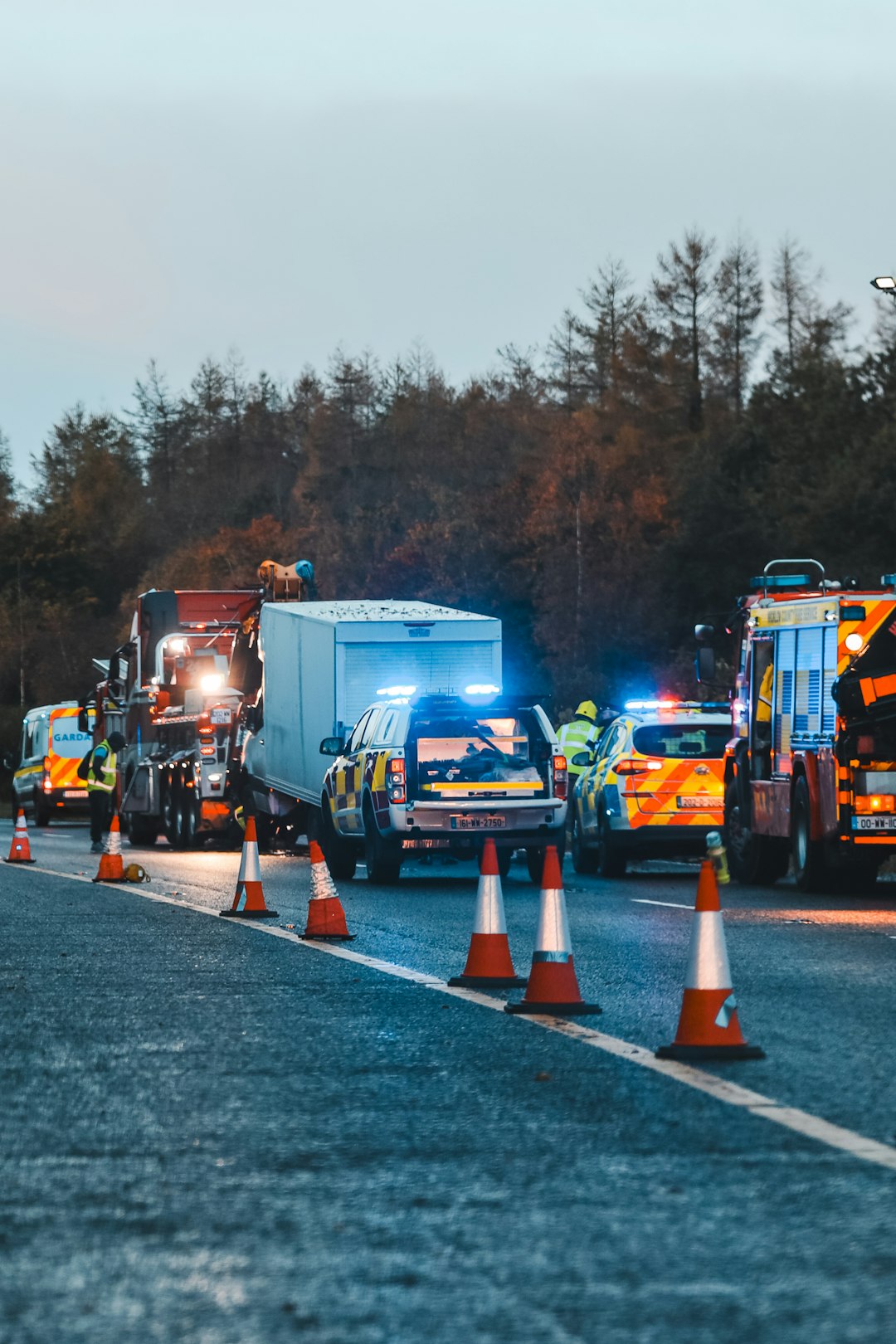

After a truck accident in Seattle, ensuring safety and calling emergency services are paramount steps that need to be taken immediately. Such incidents can be chaotic and disorienting, making it crucial for individuals involved to remain as calm and focused as possible.
First and foremost, ensure the safety of everyone at the scene. If possible, move vehicles out of the flow of traffic to prevent further collisions or hazards. However, if injuries are severe or moving someone could cause additional harm, it is best to leave them where they are until professional help arrives. Turn on hazard lights to alert other drivers of the accident and place warning flares or cones around the area if available.
Next, check on all parties involved in the accident. This includes passengers in your vehicle, other drivers, pedestrians, or cyclists who might have been affected by the crash. Provide whatever assistance you can without putting yourself or others at risk.
Once immediate dangers have been addressed, it's critical to call emergency services without delay. Dial 911 to report the accident and provide essential details such as your location, the number of vehicles involved, and any apparent injuries. The dispatcher will send police officers, firefighters, and paramedics as needed. In Seattle, emergency responders are well-trained to handle such situations efficiently.
While waiting for help to arrive, refrain from discussing fault or liability with other parties involved in the accident. Focus instead on gathering information that will be useful later on this includes exchanging contact details with other drivers and noting down witness statements if there are any bystanders willing to provide them.
In addition to dealing with physical safety concerns and legal obligations like exchanging insurance information, consider documenting the scene thoroughly if you're able to do so safely. Photographs of vehicle positions, road conditions, damage sustained by each vehicle, and any visible injuries can be invaluable when filing an insurance claim or working with legal representatives later on.
Finally, once law enforcement arrives at the scene, cooperate fully with their investigation while making sure your own account is clearly recorded in their report. Remember that even minor details may prove significant later on.
In conclusion, after a truck accident in Seattle-or anywhere-your priority should always be ensuring immediate safety followed by contacting emergency services promptly. By taking these steps systematically amidst the chaos of an accident scene you not only protect yourself but also contribute towards a smoother resolution process for everyone involved.
When involved in a truck accident in Seattle, one of the most critical steps to take is to seek immediate medical attention. This action is not only essential for your health and well-being but also plays a pivotal role in any subsequent legal processes you may need to navigate.
Truck accidents often result in severe injuries due to the size and weight of these vehicles compared to passenger cars. Injuries might not always be apparent immediately following the crash. Adrenaline can mask pain and symptoms, making it difficult to accurately assess your physical condition at the scene. Therefore, even if you feel fine, it's crucial to be evaluated by a healthcare professional as soon as possible.
Seeking immediate medical care serves several important purposes. First and foremost, it ensures that any injuries are promptly diagnosed and treated, preventing complications or worsening of conditions. For example, internal bleeding, concussions, or spinal injuries might not present obvious symptoms right away but can be life-threatening if left untreated.
Additionally, obtaining medical attention creates a detailed record of your injuries directly linked to the accident. Medical reports will document your condition and the treatments provided, which can be invaluable when dealing with insurance companies or pursuing legal action. Insurance adjusters often scrutinize claims meticulously; having thorough medical documentation helps substantiate your case and refute any arguments that your injuries were pre-existing or unrelated to the accident.
In Seattle, emergency services are equipped to handle such situations efficiently. After calling 911 from the scene of the accident, paramedics can provide initial assessments and transport you to a hospital if necessary. Even if you don't require emergency transport, visiting an urgent care facility or scheduling an appointment with your primary care physician within 24 hours is advisable.
Furthermore, follow-up appointments are equally important. Some injuries may manifest days after the incident due to delayed onset symptoms like whiplash or muscle strains. Continuous monitoring by healthcare professionals ensures comprehensive treatment and documentation of all related health issues stemming from the accident.
In conclusion, seeking immediate medical attention after a truck accident in Seattle is paramount for safeguarding your health and strengthening any potential legal claims. Prompt medical evaluation ensures timely treatment of hidden injuries while providing essential documentation needed for insurance and legal proceedings. In navigating through such distressing events, prioritizing your health by accessing immediate medical care is both a practical necessity and a protective measure for future recovery efforts.
When facing the aftermath of a truck accident in Seattle, finding the best lawyer to represent your case can make a significant difference in the outcome.. Truck accidents often result in severe injuries and substantial financial losses, making it crucial to have an experienced and reliable attorney by your side.

Posted by on 2024-09-16
Navigating the labyrinth of Washington State's trucking laws and regulations can be daunting, especially in the aftermath of a truck accident.. At the heart of this complex legal terrain lies the role of a Seattle truck accident lawyer, whose expertise becomes indispensable for those seeking justice and compensation. Truck accidents often result in severe injuries and significant property damage due to the sheer size and weight of commercial trucks.

Posted by on 2024-09-16
When it comes to choosing the best Seattle truck accident lawyer, making the final decision can feel like navigating a labyrinth.. The attorney you select will play a crucial role in your pursuit of justice and compensation, so it's vital to ensure you're making an informed choice.

Posted by on 2024-09-16
Truck accidents are a grim reality on Seattle's bustling roadways.. The sheer size and weight of these vehicles mean that collisions often result in severe injuries, extensive property damage, and tragically, sometimes fatalities.

Posted by on 2024-09-16
Choosing the right truck accident lawyer in Seattle can be a daunting task, especially when you're dealing with the aftermath of a traumatic event.. The initial consultation is your opportunity to gauge whether a lawyer is the right fit for you.

Posted by on 2024-09-16
In the aftermath of a truck accident in Seattle, it is crucial to approach the scene with a clear and methodical mindset. One of the first steps to take is to collect evidence at the scene. This process is not just about gathering information; it's about safeguarding your rights, ensuring justice, and setting a foundation for any potential legal proceedings or insurance claims.
Collecting evidence begins with personal safety. Before diving into evidence collection, ensure that you are safe and out of harm's way. Once you have established a secure position, start by documenting the scene thoroughly. Use your smartphone or camera to take photographs and videos from multiple angles. Capture wide shots of the entire scene as well as close-ups of specific details such as skid marks, vehicle damage, road conditions, traffic signals, and any other pertinent elements.
Witnesses play a pivotal role in reconstructing events leading up to and following the accident. If there are witnesses present, approach them calmly and respectfully ask for their accounts. Record their statements if possible or jot down detailed notes along with their contact information. Witness testimonies can provide crucial insights that might not be immediately apparent from physical evidence alone.
Another critical aspect is documenting your own observations. As soon as you can, write down everything you remember about the moments leading up to the accident: the weather conditions, traffic flow, speed of vehicles involved, and any unusual behaviors by drivers. These notes can be invaluable later on when memories might fade or become less precise.
Next, gather information from all parties involved in the accident. Exchange names, addresses, phone numbers, driver's license numbers, license plate numbers, vehicle makes and models, insurance policy numbers, and contact details of their insurance companies. This step ensures that you have all necessary details for follow-up actions with insurance providers or legal representatives.
Do not overlook official reports filed by law enforcement officers who respond to the scene. Always request a copy of the police report before leaving if possible or find out how it can be obtained later on. These reports often contain objective assessments by trained professionals which can corroborate your version of events.
Additionally, look around for any surveillance cameras that might have captured footage of the incident these could be from nearby businesses or traffic cameras managed by city authorities in Seattle. If you notice any such cameras nearby, make a note so that you can request access to this footage later through appropriate channels.
Lastly but importantly is preserving physical evidence until it can be formally documented or reviewed by experts if needed for legal purposes down-the-line like pieces broken off vehicles during collision etc., which could help establish key facts during investigation phase especially when liability determination becomes contentious issue between parties involved owing high stakes associated typical trucking accidents due sheer magnitude damages caused both people property alike making thoroughness paramount importance every step taken herein discussed above regarding collecting evidences effectively at scene truck accident occurring Seattle locale specifically context considered herewithal comprehensively addressed indeed!
By meticulously collecting evidence at the scene after a truck accident in Seattle - through photos/videos capturing comprehensive perspectives surroundings therein witness statements complementing subjective recollections thereof involved individuals along vital information exchanges coupled obtaining authoritative police documentation potentially supplemented surveillance footages lastly safeguarding tangible remnants thereof - one essentially fortifies case ensuring robust foundation laid either pursuing rightful compensation addressing accountability appropriately ensuing due course thereby underscoring significance this critical immediate post-accident protocol unequivocally!

Experiencing a truck accident in Seattle can be a jarring and disorienting event. Amid the chaos, it's crucial to keep a clear head and follow specific steps to ensure safety and proper legal handling of the situation. One of the most pivotal actions you must take is reporting the accident to authorities.
Firstly, make sure everyone involved is safe. If anyone is injured, call 911 immediately. Even if injuries aren't apparent, it's wise to have medical professionals examine everyone at the scene. Once immediate safety concerns are addressed, contacting law enforcement becomes imperative.
In Seattle, as in many cities, it's legally required to report any vehicular accident that causes injury, death, or significant property damage. By calling the police promptly after an accident involving a truck, you ensure that an official record is created. This documentation can prove invaluable for insurance claims and potential legal proceedings.
When officers arrive at the scene, they'll assess the situation and compile an accident report detailing their findings. Be cooperative but concise when providing your account of events. Stick to facts and avoid speculating about fault or cause; let the evidence speak for itself. The police report will include critical information such as time and location of the accident, names and contact details of all parties involved including witnesses if available, vehicle descriptions, and initial determinations about what may have occurred.
This step also helps prevent discrepancies later on when dealing with insurance companies or court cases where accurate records are fundamental. Without this official documentation from authorities, proving your version of events might become more challenging.
Moreover, reporting the accident to authorities helps in maintaining public safety standards by ensuring that any hazards caused by the collision are promptly addressed whether it's clearing debris from roads or identifying mechanical failures in vehicles that could pose future risks.
In addition to contacting local police or state troopers depending on where exactly in Seattle you are located during your mishap remember Washington State Patrol operates widely across state highways you should notify your insurance company as soon as possible too since they will require details from both law enforcement reports along with personal accounts directly from those involved.
In summary:
1) Ensure everyone's immediate safety.
2) Call 911 for medical help if needed.
3) Report the incident swiftly so law enforcement can document everything accurately.
4) Cooperate fully while sticking strictly factual statements when talking with officers present at scene.
5) Notify your insurance company subsequently using obtained reports/data provided by responding officials.
By following these steps meticulously after experiencing a truck accident within Seattle limits; not only do you comply with local laws but also protect yourself legally while contributing towards overall community welfare through ensured public roadway security measures being enforced correctly post-incident scenario analysis conducted professionally via appropriate channels initiated timely manner right away!
Experiencing a truck accident in Seattle can be an overwhelming and disorienting event. Amidst the confusion and potential injuries, it's crucial to take specific steps to ensure your safety, comply with legal requirements, and protect your rights. One of the most important actions you must take is notifying your insurance company.
Firstly, once immediate medical needs are addressed and you're safe from harm's way, contacting your insurance company should be one of your top priorities. Your insurance policy likely includes clauses that require timely reporting of accidents. Failing to notify them promptly could jeopardize your coverage or lead to complications when you file a claim.
When you call your insurance provider, be prepared to provide detailed information about the accident. This includes the location, time, and date of the incident, as well as details about all parties involved. It's beneficial to have a copy of the police report handy if one was made at the scene, as this document will contain critical information that can support your claim.
Informing your insurance company also initiates the claims process. The sooner they are aware of the incident, the quicker they can start investigating and processing any claims for damages or injuries. This step is essential because it helps ensure that repairs to your vehicle or medical expenses are handled efficiently.
Furthermore, notifying your insurer allows them to advise you on what steps to take next. Insurance agents are well-versed in handling accident cases and can guide you through collecting evidence like photos of the scene or contact information from witnesses. They may also recommend repair shops or medical providers within their network.
Moreover, this communication with your insurer provides an opportunity for you to understand what coverage applies in your situation. Truck accidents often involve significant damage and potential liability issues; knowing what benefits you're entitled to under your policy can ease financial stress during this challenging time.
In addition to dealing with property damage and personal injury claims under your own policy, informing your insurer sets up a formal record which might be necessary if there are disputes about fault or compensation later on. Truck accidents can result in complex legal proceedings due to multiple parties being involved such as drivers, trucking companies, insurers from other vehicles so having everything documented with both law enforcement and insurers is crucial.
Lastly but importantly, keeping an open line of communication with your insurance company helps prevent misunderstandings down the road. Regular updates regarding any new developments related to medical treatments or repairs ensure that all aspects of your recovery process are transparent and supported by proper documentation.
In conclusion, notifying your insurance company after a truck accident in Seattle is not just a procedural necessity; it's a vital step towards securing financial protection and ensuring smooth navigation through subsequent legal processes. Prompt notification helps streamline claims processing, provides professional guidance on next steps, clarifies coverage entitlements under stressful circumstances, creates essential records for future reference in case disputes arise ultimately leading towards effective resolution following such unfortunate events.
Experiencing a truck accident can be an overwhelming and traumatic event, especially in a bustling city like Seattle. The aftermath of such incidents often leaves victims grappling with physical injuries, emotional distress, and financial burdens. Knowing the steps to take immediately after a truck accident is crucial for protecting your rights and ensuring you receive the compensation you deserve. Consulting with a truck accident attorney can provide invaluable guidance during this challenging time.
Firstly, safety is paramount. If you find yourself involved in a truck accident, prioritize your well-being and that of others around you. Move to a safe location if possible and call 911 to report the accident. Emergency responders will assess injuries and transport those in need of medical attention to nearby hospitals.
Once safety is secured, gather as much information as possible from the scene. This includes taking photographs of the vehicles involved, road conditions, traffic signals, skid marks, and any visible injuries. Exchange contact details with the truck driver and any witnesses present. It's also essential to obtain the truck driver's insurance information and note down their employer's name since trucking companies are often liable for accidents caused by their drivers.
Next, seek medical treatment even if you believe your injuries are minor. Some injuries may not manifest immediately but could have serious long-term effects if left untreated. Medical records will also serve as critical evidence should you decide to pursue legal action.
At this juncture, consulting with a truck accident attorney becomes crucial. Truck accidents involve complex laws and regulations that differ significantly from typical car accidents. An experienced attorney understands these intricacies and can navigate through federal regulations that govern trucking companies.
Your attorney will conduct a thorough investigation into the accident, gathering evidence such as driver logs, maintenance records of the truck, black box data (which records vital information about the vehicle's operation), and more. They will also work with experts in various fields like accident reconstructionists who can provide insights into how the crash occurred.
Insurance companies representing trucking firms often deploy aggressive tactics to minimize payouts or deny claims altogether. An adept attorney shields you from such maneuvers by handling all communications with insurers on your behalf. They will negotiate tirelessly to ensure that any settlement offer reflects the true extent of your damages including medical bills, lost wages, pain and suffering, and future rehabilitation costs.
Moreover, Washington state law imposes a three-year statute of limitations for filing personal injury claims stemming from vehicle accidents. Missing this deadline can bar you from seeking compensation permanently. A dedicated truck accident lawyer ensures all paperwork is filed promptly within this timeframe while building a strong case backed by substantial evidence.
In conclusion, while dealing with the aftermath of a truck accident in Seattle might seem daunting initially; taking systematic steps can make all difference between obtaining justice or facing prolonged hardship alone Consult with seasoned professionals who specialize in trucking accidents ensuring every aspect handled meticulously allowing focus recovery knowing legal matters capable hands
In the wake of a truck accident in Seattle, taking swift and effective action can make a significant difference in your recovery and any potential legal proceedings. One of the most critical steps you can take is to meticulously document all medical treatments and expenses. This key step not only supports your physical healing but also protects your financial interests and legal rights.
The immediate aftermath of a truck accident is often chaotic and overwhelming. Amidst the confusion, seeking medical attention should be a top priority, even if you initially feel uninjured. Truck accidents can result in severe injuries that might not manifest symptoms right away. A thorough medical examination ensures that any hidden injuries are diagnosed early, preventing complications down the line.
Once you have received medical care, it is essential to start documenting every aspect of your treatment. This includes keeping detailed records of all doctor visits, diagnostic tests, prescriptions, and therapies you undergo. Each piece of documentation serves as evidence of the extent and impact of your injuries. Medical reports from healthcare providers outlining diagnoses, treatment plans, and progress notes offer an authoritative account that can substantiate your claims for compensation.
Equally important is tracking all related expenses meticulously. Medical bills can quickly accumulate after a truck accident, encompassing hospital stays, surgeries, medications, rehabilitation services, and more. Maintain copies of every bill and receipt associated with your treatment. Additionally, keep records of any out-of-pocket expenses such as transportation costs to medical appointments or modifications needed at home due to injury-related disabilities.
This meticulous documentation becomes invaluable when dealing with insurance companies or pursuing legal action against those responsible for the accident. Insurance adjusters often scrutinize claims thoroughly before approving them; having comprehensive records bolsters your case by providing clear evidence of incurred costs and ongoing needs resulting from the incident.
Moreover, accurately documented medical treatments and expenses play a crucial role if you decide to seek compensation through litigation. Your attorney will rely on these documents to build a strong case demonstrating how the accident has impacted your health and financial stability. Courts also consider this evidence when determining fair compensation amounts for damages.
Beyond its practical benefits in legal contexts, documenting everything related to your medical care empowers you personally during recovery. It allows you to track progress over time objectively while ensuring no necessary treatments are overlooked due to forgotten details amidst stress or trauma.
In conclusion, after experiencing a truck accident in Seattle or anywhere else prioritizing thorough documentation of all medical treatments and associated expenses cannot be overstated enough. This practice safeguards both immediate health needs by ensuring proper follow-up care as well as long-term financial security through robust support during insurance claims processes or potential lawsuits aimed at securing deserved compensations for suffered losses.
Experiencing a truck accident can be a harrowing ordeal, and the aftermath is often equally challenging. Beyond the immediate concern for personal safety and health, there are numerous legal and insurance aspects that need to be addressed. If you find yourself in such an unfortunate situation in Seattle, understanding how to follow up on legal and insurance claims is crucial in ensuring you receive the compensation and justice you deserve. Here's a step-by-step guide to help navigate this complex process.
First and foremost, your health should be your top priority. Seek medical attention immediately after the accident, even if you feel fine. Injuries from truck accidents might not manifest symptoms right away but can have serious long-term effects. Medical documentation will also serve as vital evidence when pursuing your claims.
Once you've ensured your well-being, it's important to gather as much information from the accident scene as possible. This includes taking photographs of the vehicles involved, road conditions, traffic signs, and any visible injuries. Collect contact information from witnesses who can provide an unbiased account of what happened.
Next, report the accident to law enforcement. In Seattle, it's mandatory to file a police report for accidents involving significant property damage or injury. The police report will serve as an official record of the incident and may be a critical piece of evidence in both legal proceedings and insurance claims.
Following these initial steps, notify your insurance company about the accident promptly. Provide them with all relevant details but stick to factual statements; avoid speculating or admitting fault at this stage. Your insurer will likely request copies of medical records, repair estimates for vehicle damage, and any other documentation related to the accident.
Engaging with legal counsel specialized in truck accidents can significantly ease this process. Trucking companies often have robust legal teams aimed at minimizing their liability. An experienced attorney can help level the playing field by representing your interests effectively. They will assist in gathering additional evidence such as maintenance logs of the truck involved, employment records of the driver, and data from electronic logging devices which may reveal critical details about driver fatigue or regulatory compliance.
Your attorney will guide you through filing a claim against either your own insurance policy or that of the trucking company's insurer depending on who is found liable for the accident. Keep meticulous records of all communication with insurers and other parties involved; written correspondence is preferable as it provides tangible proof of discussions.
If negotiations with insurance companies don't yield satisfactory results, litigation may become necessary. Your lawyer will prepare to take your case to court where they'll argue on your behalf for fair compensation covering medical bills, lost wages due to time off work, pain and suffering endured because of injuries sustained during the accident.
Throughout this entire process from initial medical treatment through potential court proceedings maintaining detailed records cannot be overstated enough: every doctor's visit note; each email exchanged with insurers; all receipts related to expenses incurred due directly from said incident must be preserved meticulously since these documents collectively bolster one's claim validity immensely while negotiating settlements/filing lawsuits alike down line ahead assuredly thusly so!
In conclusion: Navigating aftermaths post-truck-accidents requires multi-faceted approach blending prompt action alongside systematic documentation bolstered further via expert counsel engagement ensuring rights protected adequately amidst complexities inherent therein!